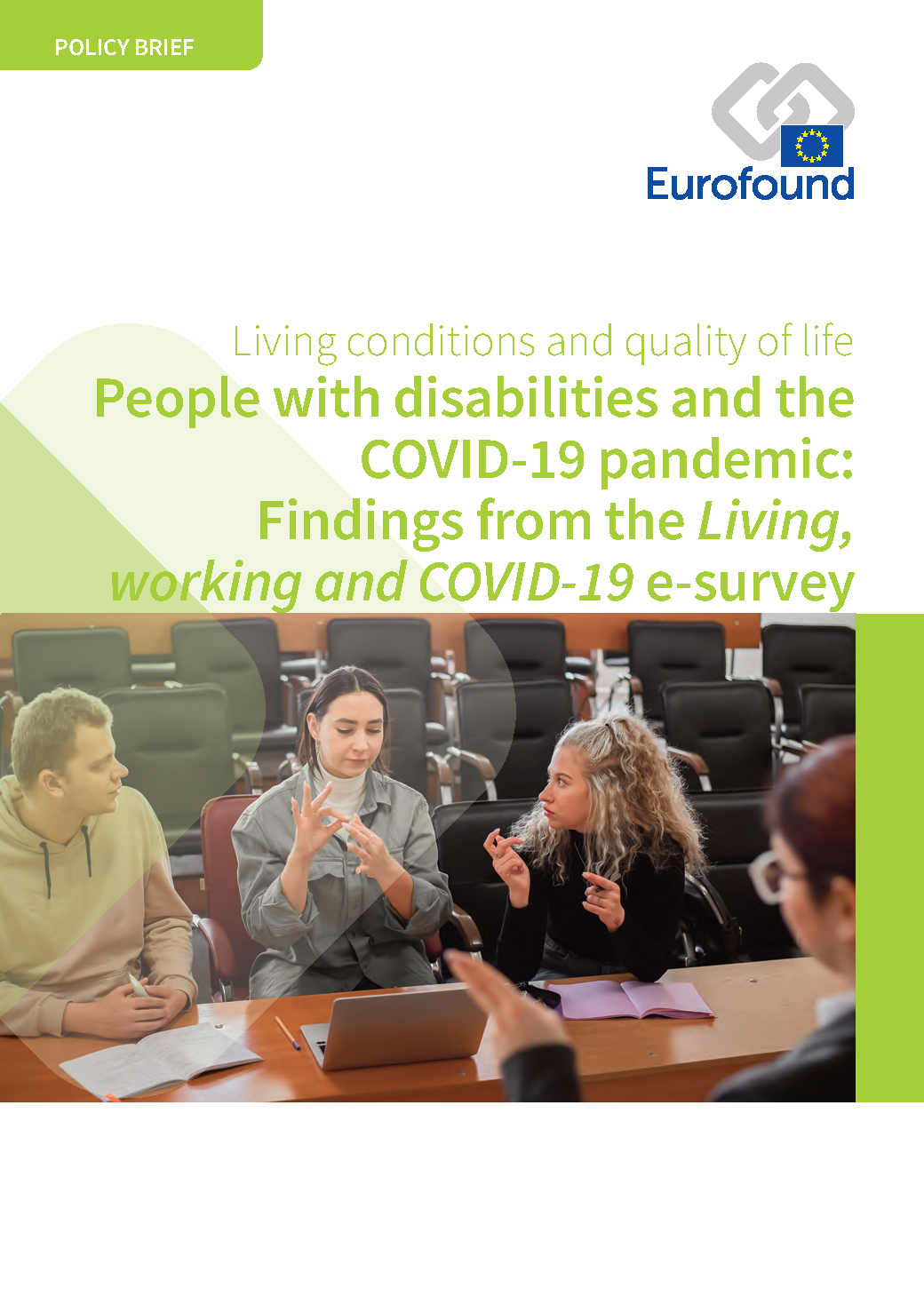
A new European Disability Strategy was launched in 2021 with the aim of intensifying progress on ensuring the full participation of people with disabilities in society. The increase of EU policy focus on people with disabilities is timely: the COVID-19 pandemic magnified the challenges they faced in many spheres of their lives.
This policy brief explores the situation of Europeans with disabilities during the pandemic. Using data from the third round of the Living, working and COVID-19 e-survey, conducted in February–March 2021, it compares the situation of respondents with and without disabilities in four areas: access to healthcare, mental well-being, financial situation and optimism about the future. The analyses show that on all indicators the situation of people with disabilities was significantly worse.
Key findings
Poor mental health affects a large proportion of people with disabilities and requires urgent attention to reduce the widespread risk of depression among this group of citizens.
The introduction of measures to mitigate the factors that lead to poor mental health will be crucial as the COVID-19 pandemic and subsequent social isolation restrictions have affected people with disabilities more than the population at large. There is an urgent need to improve access to mental healthcare services as a quarter of respondents with disabilities reported unmet medical needs in this area.
People with disabilities report more difficulty in making ends meet, greater financial fragility and higher arrears than people without disabilities. Boosting their labour market participation is critical to address this large gap in financial situation.
The European Pillar of Social Right Action Plan on the Social Economy, which aims to tap into the potential of the social economy and create quality jobs for fair, sustainable and inclusive growth, is also an opportunity to improve the situation of people with disabilities.
Improving the situation of people with disabilities requires a tailored approach. Actions to increase their sense of belonging, for instance, can help improve the well-being of young people with disabilities, whereas retired people benefit more from actions that reduce the risk of depression.
The policy brief contains the following tables and figures.
List of tables
- Table 1: Reasons for unmet healthcare needs, respondents with and without disabilities compared, EU27
- Table 2: Trust in the healthcare system during the pandemic (mean scores), respondents with and without disabilities compared, EU27
- Table 3: Difficulty making ends meet (%), by employment contract type, respondents with and without disabilities compared, EU27
- Table 4: Arrears among respondents with and without disabilities (%), by type of arrears and employment status, EU27
- Table 5: Percentage of respondents with disabilities in arrears (%), by type of arrears, EU27
- Table 6: Gap between respondents with and without disabilities (percentage points), by type of arrears, EU27
List of figures
- Figure 1: Unmet healthcare needs of respondents with and without disabilities (%), EU27
- Figure 2: Unmet healthcare needs, EU27
- Figure 3: Unmet healthcare needs (%), by type of healthcare, respondents with and without disabilities compared, EU27
- Figure 4: Trust in the healthcare system, EU27
- Figure 5: Risk of depression, EU27
- Figure 6: Self-reported loneliness, EU27
- Figure 7: Feeling left out of society, EU27
- Figure 8: Difficulty making ends meet, EU27
- Figure 9: Able to maintain standard of living without an income for no more than 3 months, EU27
- Figure 10: Proportion reporting arrears (%), by type of arrears, respondents with and without disabilities compared, EU27
- Figure 11: Optimism about one’s future, EU27
- Number of pages
-
28
- Reference nº
-
EF22019
- ISBN
-
978-92-897-2254-4
- Catalogue nº
-
TJ-AR-22-001-EN-N
- DOI
-
10.2806/146029
- Permalink
Cite this publication
Eurofound (2022), People with disabilities and the COVID-19 pandemic: Findings from the Living, working and COVID-19 e-survey, COVID-19 series, Publications Office of the European Union, Luxembourg.
